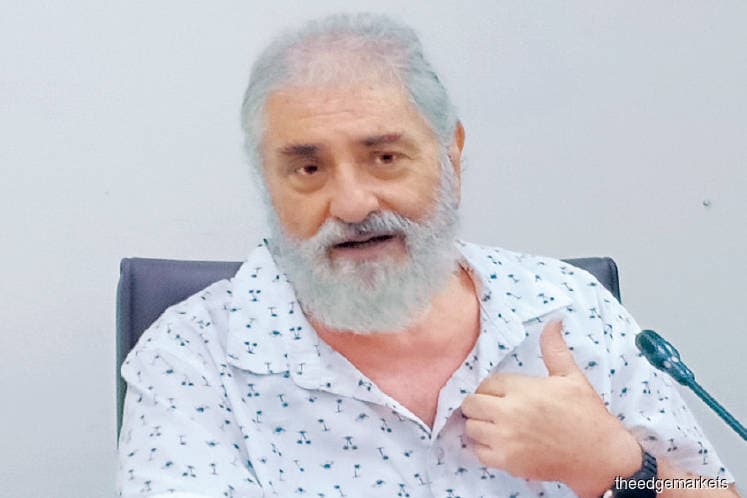
This article first appeared in The Edge Malaysia Weekly on May 18, 2020 - May 24, 2020
WHEN young people work together on common problems from a tender age, they learn to value their friendships for life, says an expert with a lifetime’s worth of experience in cross-cultural communications, teaching strategies and the connections between languages and society.
“Get children together to work on some important problem that affects the people. It can be about the environment, a social problem, Orang Asli issues or anything else,” says Prof Evangelos Angelou Afendras, an educational trainer and consultant from Greece with a long connection with Malaysia.
His ties to the country reach back to the 1970s, when he worked on the development of Bahasa Malaysia, focusing on the sociology of language and communication.
To build bridges across communal barriers, the key is to involve students in project-based learning, action learning and activities that bring about transformative experiences, he tells The Edge in an interview.
Citing his involvement in a project to train teachers of an international school, Afendras says the immersive experiences can even involve going to India to provide relief to disadvantaged groups like the Dalit community. There the students helped to run a mobile ophthalmological unit that provided glasses and even surgery for the target group.
While such projects need to be flexible in order to cater for the diversity of school systems in the country, their role in providing a forum for systematic collaboration among students makes them worthwhile, says Afendras.
“By working on common projects, the students will naturally develop a sense of solidarity that is needed in society,” he continues. “This must begin from kindergarten upwards, because to develop social cohesion, we have to start early.”
A sense of national solidarity cannot be grafted on to students in university after years of school life built on a silo view of the world, notes Afendras.
He was responding to a question about effective educational techniques for encouraging empathy and healthy dialogue among Malaysia’s diverse communities. The query was in reference to recurring cases of inter-communal friction that had flared up in the social media space in recent times.
Cross-cultural communication has been a lifelong practice for Afendras in the form of auto-ethnographic reflection, which meant drawing on his personal experiences as a tool for his research and teaching work.
Among other things, he also references his experience in social change with the Indonesian reform movement Rumah Peneleh, which has made him its international ambassador. The nerve centre of the Indonesian independence movement, Rumah Peneleh has now become a youth-led organisation that addresses social issues such as poverty and drug addiction.
Along with action learning, students need to be coached in the techniques of introspection, so that they learn to look inside themselves from a young age “to realise who they are and who they want to be”, Afendras remarks.
A valuable tool for developing this skill is to maintain a reflective diary, says Afendras, who has taught this methodology in various cultural settings.
In Oman, for example, where he developed university courses in public and professional communication, maintaining a reflective diary helped students to look beyond the highly structured environment they had been used to.
Afendras also advocates the concept of a negotiated syllabus, where students determine what they wish to learn.
“Instead of walking into class with a prepared syllabus that is like a frozen roti canai that you heat up and serve,” he comments in parenthesis.
When developing a negotiated syllabus, students are asked: what do you think you should learn on this subject?
Relating his experience at the Sultan Qaboos University in Oman, Afendras says that in a few minutes of being asked the question, the class of 20 were up on their feet, “as if boiling with ideas”. Their ideas were distilled into 40 proposals, and each proponent was given five minutes to make his or her case for the ideas that had been proposed.
The next step was to get the students to draw up the syllabus, with the master guiding them if they went off track.
To emphasise the importance of inquiry in the pursuit of knowledge, Afendras makes reference to the Socratic tradition of posing philosophical questions that lead to the discovery of truth.
This quality, he notes, is at the core of the higher order thinking skills that are a hallmark of effective education.
In contrast, a common problem in educational institutions is that instruction is given in a rigid, non-interactive manner that suffocates the spirit of inquiry, says Afendras.
He cites the experience shared by a former student who expressed her frustration at an extreme example of such a teaching style “that drove her to tears”.
“The lecturer reads from a prepared text, there is no eye contact, he takes no questions, and after delivering his lecture walks out of the class,” says Afendras. “This is anathema to critical thinking because we need to stimulate minds.”
Rash Behari Bhattacharjee is an associate editor at The Edge
Save by subscribing to us for your print and/or digital copy.
P/S: The Edge is also available on Apple's AppStore and Androids' Google Play.